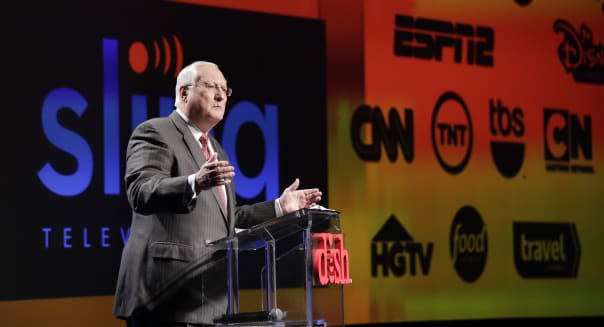Will Data Caps Kill Streaming TV?

This has been a defining year for streaming television services. It kicked off in February with the launch of Dish Network's (DISH) Sling TV. Since then we've seen the arrival of PlayStation Vue and HBO Now, and now even Showtime is jumping into the fray with its own stand-alone online platform.
Consumers want to cherry-pick the shows and movies that they want to see -- and perhaps just as important, they want to dictate exactly when they want to watch their desired programming. That's enough to send shock waves through the realm of cable and satellite television providers, but an unlikely industry may come to save the day for the cable providers and spoil the party for consumers.
You can't stream content without connectivity, and we're starting to see mobile and broadband companies turn to data caps as a way to combat the spike in traffic that they are experiencing as a growing number of video buffs access chunky TV show and movie files.
Going Down the Rabbit Hole
Comcast (CMCSK) is the country's largest cable provider, but now it has as many broadband customers as it does video subscribers. That finds it in a complicated situation where it's losing pay-TV customers, yet offsetting some of the "cord cutting" sting by selling folks speedy access to the growing number of streaming TV offerings.
%VIRTUAL-WSSCourseInline-908%Comcast began testing data caps in Nashville three years ago, where it limits the amount of included data, charging extra for additional consumption. It expanded the test last year. Limiting home Internet accounts to as little as 300 gigabytes a month may not seem like such a big deal. That's a lot of data by today's standards. However, the improving quality of high-def streaming is going to find more people bumping up against that ceiling in the coming years. The arrival of streaming TV will be even more taxing to consumption as folks rely on bandwidth instead of cable or satellites to deliver content.
Now that Netflix (NFLX) has warmed up to Ultra HD 4K for some of its content, data caps will be put to the test. After all, streaming 1080p in all of its intended glory on Netflix takes 4.7 gigabytes an hour, but that quadruples to 18.8 gigabytes an hour in 4K. Unless there are bandwidth-saving workarounds in place, we're talking about going through an entire month's worth of data within a single day of binge viewing.
Deeper Into the Rabbit Hole
The widening data files and increasing appetite for streaming TV could be a recipe for disaster, but that's where mobile and broadband companies can start to turn to the different premium TV platforms to pitch in. AT&T (T) raised a few eyebrows last week after asking the Federal Communications Commission to block a request made to prohibit wireless carriers from granting data cap exemptions to streaming TV services.
AT&T already has a sponsored data plan in place where businesses pay to be excluded from the data tally. Companies send money to AT&T so that the meter stops running when someone's on their site. Given AT&T's seemingly low ceilings of 150 gigs a month for DSL and 250 gigs a month for U-verse, that could be a pretty compelling point for companies serving up chunky media files.
This is the kind of plan that would seem to be working in favor of consumers, but the request that AT&T is trying to block was actually made by a consortium of businesses and consumer advocacy groups. How is that so? Well, the fear here is that streaming TV services will have to charge consumers more to cover the broadband subsidies.
This places us at the doorstep of a challenging tomorrow as the dominant broadband and mobile Internet providers often double as pay-TV providers. It's easy to see why they would want streaming TV to fail if it means losing customers paying fat monthly cable and satellite television bills. It's a small problem today, but it could be a big problem tomorrow.
Motley Fool contributor Rick Munarriz owns shares of Netflix. The Motley Fool recommends and owns shares of Netflix. Try any of our Foolish newsletter services free for 30 days. Want to make 2015 a winning investment year? Check out The Motley Fool's one great stock to buy for 2015 and beyond.

